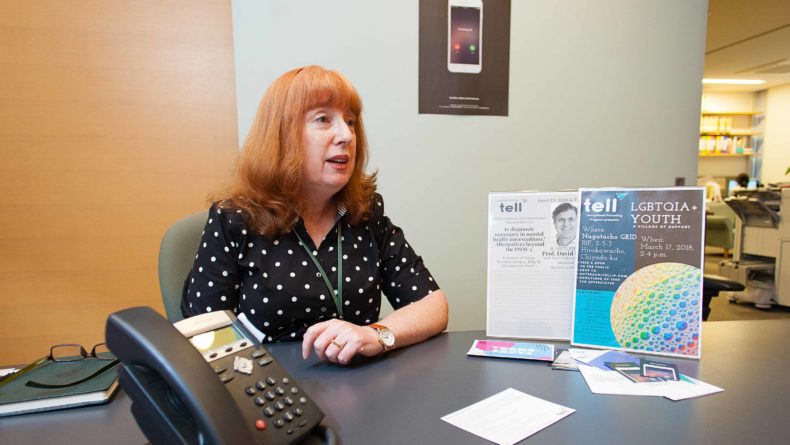Depression In Japan: Reaching Out When Things Are ‘Not OK’
Who To Contact And What To Do If This Happens To You
All of us have times when we feel down, or as if nothing is going right. But what about when you can't shake off those feelings? While it can be difficult to admit to ourselves—or to others—that we feel depressed, it's important to reach out and seek help.
A working mom of two school-age kids, Di* is used to being on the go. Three years ago she found herself with more on her plate than usual, with her oldest graduating from elementary school and her PTA duties as one of the graduation committee members, plus a health scare with her Japanese mother-in-law.
“I somehow got through it all, then a few weeks later, after things had calmed down, I found myself falling to pieces,” she recalls. “I sat around crying for no reason and wanted to stay in bed. I didn’t want to go out, and I lied to my workplace about being sick. I didn’t want to be around people—even my own family and close friends.”
Di was puzzled by her feelings: “I felt I was being silly because I had nothing to be miserable about. And yet, I was extremely unhappy.”
Understanding the symptoms
Di was displaying a number of typical symptoms of depression. Selena Hoy, TELL Outreach Coordinator, says, “Some signs of depression include a depressed or irritable mood, loss of enjoyment or interest in activities you once cared about, feeling guilty or worthless, withdrawal from people or society, sleeping difficulties and changes in eating habits, and lack of energy or motivation.”
Hoy’s colleague Vickie Skorj, TELL’s Lifeline Director, adds, “It is also common with depression to have thoughts of suicide, to feel you are failing at everything, that things will never get better, that you are a burden and others would be better off if you weren’t here. For anyone struggling with depression, these thoughts are not rational or real, that is the illness talking and with support and treatment, you will get better. Learning about the symptoms of depression is particularly important for women who are more genetically vulnerable to the illness due to changes in their hormone levels, especially during puberty, pregnancy and menopause.”
‘I felt I was being silly because I had nothing to be miserable about. And yet, I was extremely unhappy.’
In recent years, the media In Japan have started discussing the phenomena of gogatsu-byo or “May Sickness.” It refers to the depression-like mood that seems to descend on many people in May, after returning to the office or school after the Golden Week vacation. April is a busy and exciting time in Japan, with kids moving up a grade or starting new schools, and adults starting new jobs or new positions. Everyone is busy adjusting to new routines, new friends or colleagues, and maybe even a new home. However, when May rolls around and they have adjusted to the “new normal,” reality kicks in and they realize things may not be as good as they had thought.
“This can affect the foreign community in Japan, though not everyone follows the April-March cycle, so it varies. However, it’s true that during a time of change or upheaval, we are often so busy keeping up with the changes that the depression or dissatisfaction doesn’t catch up with us until we have time to settle into the new situation,” says Hoy.
In retrospect, Di now realizes this was similar to her situation. “After a very hectic period when I was pushing myself to the limit, my body and mind seemed to be saying, ‘No more!’ and that’s when my depression set in.”
Unexpected changes can be a cause, too
Priya* is a single woman working in a competitive environment where the men outnumber women by three to one.
“I loved my job and usually I thrive on the pace. On the other hand, I really cherish my friends and my downtime on the weekends, which helps me balance things,” she says. She was devastated when her best friend, another foreign woman, announced she was leaving Japan and went back to her home country in March last year.
“In my mind, I know this is a risk with every friendship I form with other foreign people here. Anyone of us might decide to leave Japan at any time. Still, it was a big shock,” Priya shares.
“I became quite insular and thought, why bother to try to form friendships?” When she wasn’t at work, the gregarious young woman found herself holed up in her small apartment. Eventually, her performance at work was affected and her manager had to warn her to improve her performance.
According to TELL’s Hoy and Skorji, living in another country and culture can exacerbate depression.
“Moving to a new place often means that you lose some of your support systems, and it takes time to build new ones. Adjusting to a new culture can also make you question your values and ideas of where you fit in society. Those are hard changes to make. And women are sometimes an accompanying spouse, without the built-in social and support systems that a working environment provides. This can be isolating,” Hoy says.
‘For anyone struggling with depression, [suicidal] thoughts are not rational or real, that is the illness talking and with support and treatment, you will get better.’ – Vickie Skorj, TELL’s Lifeline Director
Japan may be particularly challenging for foreign women.
“For foreign women who move to Japan due to work, working in corporate Japan, even international corporations, can be challenging. Currently, Japan is ranked 114 out of 140 countries for gender equality. Chances are whether you are in the workforce or a stay-at-home partner, as a female you will experience life in Japan very differently from a foreign male,” points out Skorji.
Hoy offers some helpful advice to keep in mind regarding medication.
“We (at TELL) believe that medication is important and necessary for some people, and that it can save lives. But medication without accompanying lifestyle changes and medication management techniques may not be very useful. The medication model is probably prevalent in Japan because it is covered by National Health Insurance, while most talk therapy is not.”
The importance of reaching out
Both Di and Priya were reluctant at first to share their feelings with others for fear of seeming weak, but luckily, a caring friend reached out to each woman. In Di’s case, a Japanese friend and fellow mom gently suggested that Di wasn’t herself and could benefit from seeing a health professional. Di went to see a sympathetic female doctor in her area and talked things over. After being given some medication to help her calm down, Di was able to share her feelings with her husband and kids, and ask for their support.
“Since then, I’ve found that several of my friends, foreign and Japanese, have been through something similar,” says Di.
“We keep quiet about our feelings through fear… of what? Admitting to people that we aren’t superwomen? We really need to share with each other, because through sharing we know we are not alone.”
Priya opened up to a woman in her circle from her home country who has been in Japan longer.
“She told me had also been through some hard times, which made it easier for me to admit that I wasn’t coping,” Priya says. Eventually, she got professional counseling in English and took some time off to go home and see her family to regroup. She has started going out again and enjoying social activities but also makes sure to carve out time just for herself, too.
‘We keep quiet about our feelings through fear… of what? Admitting to people that we aren’t superwomen?’
What if you are worried about a family member or friend?
“Ask them how they’re doing. Tell them you notice they’ve seemed different lately. Be ready to listen, but don’t try to fix or handle everything yourself,” Hoy advises. “Help them to find resources and referrals—if they are depressed, it might be too overwhelming to do this themselves.”
Helpful resources for the international community
The following is not an exhaustive list, but includes professionals who other foreign women have found helpful. It is important to find a professional and a plan that works for you, so don’t hesitate to reach out and see what resources might be a good fit for your situation.
TELL have been helping the foreign community in Japan for more than 45 years. You can call Lifeline at 03-5774-0992, 9 a.m. to 11 p.m. daily for free, anonymous, non-judgmental phone support in English. If you have something that is ongoing, TELL Counseling and International Mental Health Professionals Japan (IMHPJ) can assist. Finally, TELL Outreach provides various activities, lectures and training for schools, companies and the community around various topics that are relevant to mental health.
- IMHPJ (International Mental Health Professionals Japan): is a nationwide list and profiles of English-speaking therapists in Japan.
- Tokyo International Psychotherapy: Main Office (Shibuya): www.tiptokyo.com | Futako-Tamagawa Office: www.tip-nikotama.com
- British Counselling Kansai (Osaka/Kobe/Kyoto)
Finally, online counseling is also an option these days. This service is recommended.
Read these articles if you’re suffering from any of the following issues:
*Names have been changed to protect privacy.
















Leave a Reply